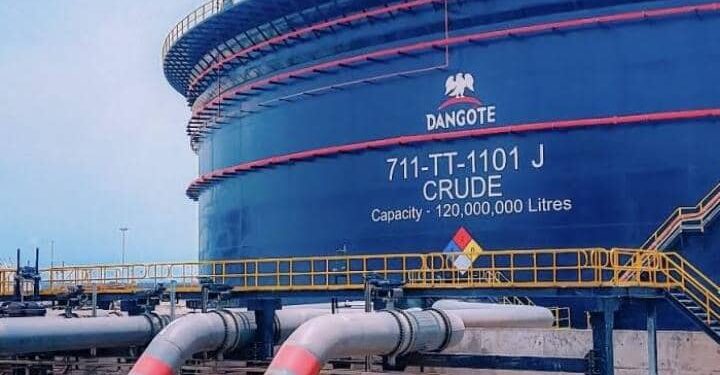Dangote Refinery, Africa’s largest oil refinery, has recently disclosed ongoing challenges with securing an adequate crude oil supply for its operations. This revelation comes despite claims that the Nigerian National Petroleum Corporation (NNPC) has increased its crude oil allocation to the refinery.
On Thursday, Anthony Chiejina, the Group Chief Branding Officer and Communications Officer, stated that the refinery’s difficulties are primarily due to the Nigerian Upstream Petroleum Regulatory Commission (NUPRC). According to Chiejina, the NUPRC has failed to enforce the domestic crude supply obligations, impacting the refinery’s ability to receive the required volume of crude oil.
Dangote Refinery has reported that it received only a portion of the crude oil needed to meet its production targets. The refinery has struggled to secure the remaining crude from both international oil companies (IOCs) and NNPC. The refinery’s statement clarified, “Our attention has been drawn to media reports suggesting that Dangote Refinery acknowledged receiving about 60% of the 50 million barrels we were allocated by NNPC. To clarify, we have never accused NNPC of failing to supply crude. Our primary concern has been NUPRC’s reluctance to enforce domestic crude supply obligations and ensure we receive our full crude requirement from both NNPC and IOCs.”
For September, Dangote Refinery required 15 cargoes of crude oil, of which NNPC allocated six. Despite appeals to NUPRC, the refinery has been unable to secure the remaining cargoes. When approached, IOCs redirected the refinery to their international trading arms or indicated that their cargoes were already committed.
The statement continued, “We continue to insist that we are unable to secure our full crude requirement from domestic production and urge NUPRC to fully enforce the domestic crude supply obligations as mandated by the Petroleum Industry Act (PIA).”
Vice President of Dangote Refinery, Davakumar Edwin, emphasized that adherence to regulatory guidelines would enable the refinery to deal directly with Nigerian crude oil producers, fostering economic growth. Edwin also highlighted the refinery’s difficulties with IOCs, who are reportedly frustrating efforts to secure locally produced oil at fair prices. He noted that the refinery is forced to purchase crude oil at a premium of $2 to $4 per barrel, exceeding the official price set by the commission.























































